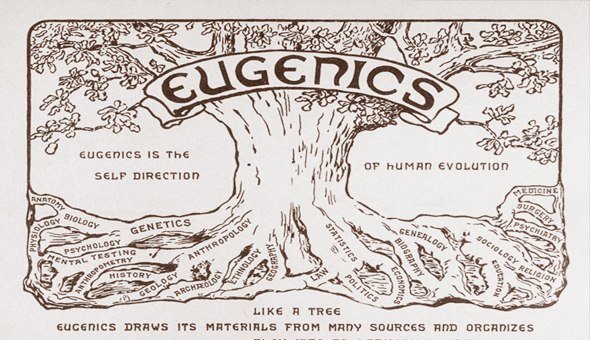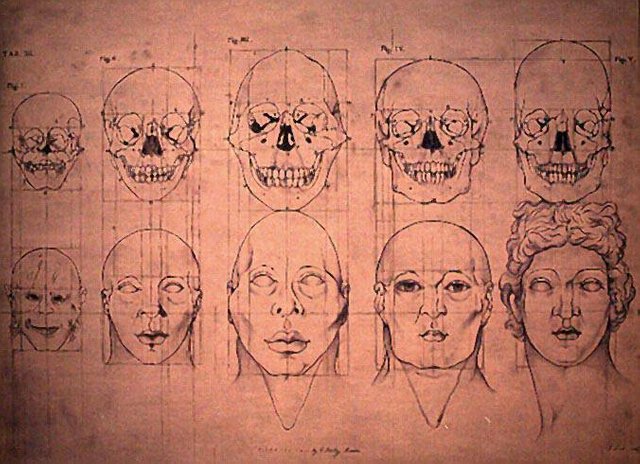Eugenics - the forbidden science of the future
Eugenics - the forbidden science of the future

As you know, good intentions paved the way to hell. It was not about the "new race" that Francis Galton dreamed of when he introduced a new science - eugenics - to the public court. Through the efforts of the Nazis, the reputation of eugenics is so tainted that the word itself continues to be abusive. And yet this science could save people from disease, suffering and even death itself

And how well it all started!
At first, eugenics was welcomed with cheers. The most outstanding people in the late XIX - early XX century willingly rose to the banner of the new science, which proclaimed its task to improve the human race and prevent human suffering. "Because of birth defects, our civilized human species is much weaker than in animals of any other species - both wild and domesticated ... If for the improvement of the human race we have spent the twentieth part of the forces and means that are spent on improving the breed of horses and livestock , What a universe of genius we could create! ". With this reasoning of Francis Galton, Bernard Shaw, and Herbert Wells, and Winston Churchill, and Theodore Roosevelt readily agreed. And how can I disagree? In a man everything should be fine! Chekhov's thought lives, but does not win, encroaching on human imperfection. For each of us is imperfect. Look around you, and you will surely notice how nature has endowed all "unequally, unevenly": someone handed over excellent brains, but saved on health, and someone made happy by an unusually attractive appearance, but the addition gave a nasty character. That's why people admire so much, in which beauty and kindness, and mind and strength are combined at once. Such few. But I would like more ...
Actually, even the ancients began to think about improving the human breed. The same Platon (428-347 BC) in his famous "Politics" spoke about the need for state intervention in the regulation of marriages, explained how to select spouses in order to produce physically strong children with outstanding moral principles. The famous "center of breeding" in antiquity was Sparta. There, babies, deprived of the physical qualities necessary for future soldiers, without any extra thought, were simply dropped from the cliff. To criticize or condemn the Spartans today is absolutely pointless: such were the mores of the society where boys were given birth with only one purpose - to replenish the army. By the way, this goal was achieved: and today everyone remembers that "in a healthy body - a healthy spirit, one Spartan costs two" ...
The best of the best
Years flew, centuries rolled by, and mere mortals still tormented themselves with their own imperfections and figured out how good it would be to live surrounded by entirely pleasant ones - that outwardly, that internally - of people ... And while they were suffering with manilovism, the scientists reflected on how to achieve this on practice.
So, the first person to take up this issue was the English scientist - geologist, anthropologist and psychologist Sir Francis Galton. Spicy detail of the biography: Sir Francis was a cousin to Charles Darwin and fervently supported his theory of evolution. Being an aristocrat, Galton did not go far for materials for research, and began to study the genealogy of the famed noble families of England. He tried to establish the laws of inheritance of talent, intellect and power. Then, in the late XIX - early XX century, it was fashionable to engage in all sorts of selection and selection. The fact that the laws of Gregor Mendel about the inheritance of signs were rediscovered played a role. Did not stay away from the new-old trends and Galton. He argued that once a new breed was selected, the best animal producers should be selected, and a targeted selection of married couples should bear fruit. Moreover, it seemed so simple: that healthy, beautiful and talented children were born, it is necessary that their parents become the best of the best! Actually, that's why the new science was called eugenics, which in Greek means "the birth of the best." Here is what Galton himself said about this: "We define this word to refer to science, which in no way confines itself to the question of proper mating and about marriage laws, but, mainly in relation to man, studies all influences that improve the race, And these influences tend to strengthen, as well as all the influences that worsen the race, and they tend to weaken. " Notice! There is not a single word about the necessity of deducing "eugenically valuable populations". And, nevertheless, very soon there was a split in the eugenic society. And that's why. Any breeder knows that in order to deduce a new, improved breed, about 95% of the "source material" - animals, birds, seeds, etc., etc., should be rejected, etc. The basic postulate of any selection: the worst (weak) should not participate in reproduction . Here on this and this underwater stone and came across eugenics. This is where the head-on collision of the new science took place with human ethics and morality.
Split
The most zealous adherents of the new science seemed to slightly improve the hereditary qualities of man, using only genetic principles. It is this eugenic called positive. But support in the society was eugenic, later called negative. Her followers decided that, in order to preserve humanity, it is generally necessary to prevent the emergence of offspring in people with mental and physical disabilities, alcoholics, drug addicts, criminals. Here, as an excuse, it is worth noting that in the second half of the XIX-first decades of the 20th century, the society, quite civilized and enlightened, was seized by the fear of degeneration. Newspapers regularly reported on the growing number of mentally ill people and other "damage" of human nature - mental, physical and moral. The data were also confirmed by science. In this light, the ready decision to improve humanity as a species, proposed by negative eugenics, seemed more than acceptable.
The Indian method
The first to fight the degradation of mankind ventured into the United States. In 1904, the law on sterilization was enacted and enacted in Indiana. Forcibly sterilized "inferior" individuals in the face of alcoholics, mentally ill and recidivists. Actually, by the name of the state, the method was called the Indian one. I must say, it was very popular: one way or another, but in 26 years it was tested in forty states.
With this approach, "unfit human material" was practically excluded from the process of reproduction. One misfortune: "unhealthy", as a rule, people who did not manage to be socially recognized. There was a substitution of concepts: eugenics tried to heal "ulcers of society" - poverty, alcoholism, vagrancy, crime and prostitution.
Crazy? Castrate!
Otherwise, we approached the "eugenic" issue in the Nordic countries. Beginning in the late 1920s and 1930s in Denmark, Sweden, Iceland, Norway and Finland, a targeted policy of sterilization of the mentally handicapped was conducted at the government level. As in the USA, they were sterilized, thus preventing the transmission of harmful genes.
What is noteworthy, everywhere the law on sterilization was adopted "with a bang." No one - neither the public, nor scientists, nor the doctor * - saw anything reprehensible in him, and therefore did not oppose it. So, in an atmosphere of full consensus, a mentally retarded child could be taken to a closed institution after a proper test. Want a child back? Be kind, sterilize it. Under the same scheme, they did the same with adults. They were simply put in the notice-you must be deceased, you are sick and therefore you are decided ... And as a rule, there was nowhere to go to such patients. Of course, the issue of ill-health of this or that individual was determined by a special commission. But who was included in this commission? And when! The fate of some "sick" was solved in the ministries of health, and the fate of others - ordinary doctors, and sometimes even the pastor, along with representatives of the guardianship and / or public education. So, the "reliability" of the conclusions in most cases, I think, was doubtful ... But then, for some reason, no one thought about it. In Scandinavia, everyone was so carried away with the idea of improving society by castration, that in the late 1930s they were ready to follow the path of the United States and begin to sterilize Putane, vagabonds and all other "predisposed to antisocial behavior"
A new breed of people
Everything dramatically changed in 1933, when the National Socialists came to power in Germany. Actually, it was the Nazis who scored the last nail in the coffin of the eugenics, having begun to substantiate with its help the racial policy of the Third Reich. All "non-Aryans" were recognized as "subhuman" and in order to improve "the breeds of people were to be destroyed ..

As for the sterilization, which was so popular with everyone, in Germany it took a truly unprecedented scale: only in 1942 there were sterilized more than a thousand people - and this among the civilian population. The number of victims of eugenics in prisons and concentration camps was estimated at tens of thousands. Nazi doctors worked out new methods of sterilization for prisoners - radiation, chemical, mechanical, etc., etc. In essence, these were sophisticated torture. Then, at the Nuremberg trial, the Nazi "explorers" were recognized as executioners. And on anything not guilty the eugenics were taboo ...
A geneticist is a friend of man
Actually, officially this taboo so no one took off. And, nevertheless, the positive eugenics is now beginning to revive. For all studies related to human DNA are nothing more than manifestations of eugenics. What, for example, gives the decoding of the human genome? You can find out which hereditary diseases a person is predisposed to, and warn them. Example?
Yes please! In the USA, among the Ashkenazi Jews, children with amaurotic idiocy of Thea-Saks were often born. This is a hereditary metabolic disease, in which the child's nervous system is affected. As a result, the baby is doomed to an early death. But the situation changed after the Ashkenazi representatives began testing for this pathology. In the case when both spouses were carriers of the "sick" gene, fetal studies were carried out during pregnancy. And if it turned out that the embryo suffers from the disease of Thea-Saks, the pregnancy was simply interrupted.
 Rather, they gave parents the choice to leave the sick child or not. Most often the answer was: "No!" Refuse further gestation, as a rule, and in those cases when a child in the womb is diagnosed with "Down syndrome". In the same America, for example, more than 90% of the embryos that have suffered such a terrible verdict are being aborted
Rather, they gave parents the choice to leave the sick child or not. Most often the answer was: "No!" Refuse further gestation, as a rule, and in those cases when a child in the womb is diagnosed with "Down syndrome". In the same America, for example, more than 90% of the embryos that have suffered such a terrible verdict are being aborted
Meanwhile, a child with Down's syndrome can be born even with absolutely healthy parents. From this no one is immune. So, in theory, today before the conception of the child should go to see genetics. Especially if there were serious illnesses in families on the paternal or maternal line. Medico-genetic counseling will make it clear: do you risk deciding to have a baby, or are your fears equal to zero? Thus, you can insure against many problems in the future.
In the United States, England, Sweden and Finland, prospective parents are now being asked to explore the karyotype, a set of chromosomes, in advance, in order to identify possible chromosomal rearrangements and reduce the risk to no ... What is it, if not eugenics? What is it, how not a person's improvement? What is this, if not deliverance from suffering? What is this, if not humanism?

Wonderful post,learned a lot ,thanks !
Great post! Very interesting information! Thank you for sharing!
Хороший пост , много интересного, спасибо.
Wonderful post!
Супер информация! Спасибо большое, узнала много интересного! Я не со всем согласна - никто не имеет права решать за других людей: жить им или нет. Но, как любая наука, имеет право на существование.